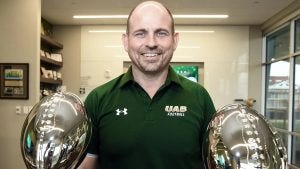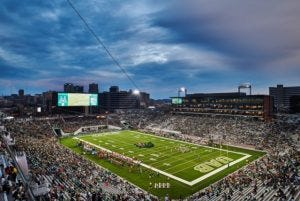Sunday Morning Coffee — July 3, 2022 — The Right Guy Says Goodbye
Unless you are the most ardent college football fan or live in the state of Alabama, the name Bill Clark means nothing to you.
In fact, if you are the most ardent college football fan and live in the state of Alabama, the name Bill Clark may not mean anything to you anyway.
Simply, over the last eight years, Bill Clark’s story is better than that of Georgia’s Kirby Smart or Clemson’s Dabo Sweeny or, heaven don’t strike me down, maybe even Alabama’s Nick Saban.
No, Clark never won a national championship like the others, and odds are never will. But what he did with a downtrodden and soon to be extinct college football program goes way beyond lifting a trophy with confetti falling at midnight.
Clark was set up to fail by the University of Alabama-Birmingham, or UAB, as it reads on the ESPN crawl. Please do not mistake UAB for the University of Alabama-Tuscaloosa. The only thing they have in common is a campus in the same state and the love of Milo’s Sweet Tea. Plus they are both controlled by the same board of trustees. And for UAB, that’s the rub.
UAB falls under the University of Alabama System Board of Trustees. The board oversees three institutions: the mother lode University of Alabama and its two little cousins, UAB and UAH, University of Alabama-Huntsville. The board wants to see both schools excel in academics, research and medicine, but never on the athletic field. That’s a holdover from Bear Bryant’s days when Coach Bryant felt there should only be one athletic powerhouse in the state and that was in Tuscaloosa, not Birmingham or Auburn. Huntsville isn’t a factor as they don’t play big time football or basketball. Alabama is powerless to do anything about Auburn; they answer to their own board. So, all Bama can do is give Auburn a beating every November in the Iron Bowl. However, they can control the kid 45 miles east in Birmingham. They won’t play UAB in football or basketball. It’s their way of not recognizing either program. In fact, and they won’t come out and say it, but anything they can do to stifle UAB on the gridiron or hardwood is part of the agenda. In the past UAB had verbal agreements with a couple of name football coaches to head its struggling program, Pat Sullivan and Jimbo Fisher, and each time the UA Trustees nixed it. If UAB had to have a D-1 football program, Bama much preferred marginal coaches to keep public interest non-existent.
Therefore, it’s really no wonder that UAB football has always struggled. It plays in a conference, Conference USA, in the bottom third of college football where all schools always have New Year’s Day free. To make matters even tougher for UAB, they played their home games in dilapidated Legion Field, located in a tough part of inner city Birmingham. UAB football would attract maybe ten to twelve thousand a game in a stadium that once held 70,000, until the upper stands were condemned as sewage tended to leak to the lower level on game days. It was a lovely atmosphere. UAB had to schedule around start times for Alabama and Auburn to hope anyone would watch. Even noon games at Legion Field were still too dangerous for parents to bring their kids.
The only chance UAB had to make any money in football was by scheduling away games and picking up a big participation check to get beat by forty. Tennessee, Georgia, Florida, South Carolina, Mississippi State, Arkansas and even Auburn were willing to host and get a sure W. Alabama would never play their version of the red headed stepchild. And really who could blame Nick Saban? He’s still seething from the 13-10 licking his LSU team took from UAB back in 2000 as a 34-point underdog. It was the first program defining win in Blazer football history, but still didn’t capture much public interest after the Sunday morning headlines got stale.
That was until Bill Clark got there. There was nothing about Clark’s coaching resume prior to coming to UAB in 2014 that said, ‘we’ve got to have this guy.’ He was successful at the high school level winning back to back championships at Prattville High School outside of Montgomery in 2006 and ‘07. The University of South Alabama in Mobile lured him away to become its defensive coordinator for four seasons before he returned to his alma mater, Jacksonville State, in 2013. No, not the Jacksonville that has the ships, beaches and golf courses, but the Jacksonville in Alabama where nights in Oxford and Anniston meant going out on the town.
Actually, UAB basketball was the school’s marquee attraction since 1978 when they hired heralded Gene Bartow away from UCLA to start the program. Success was immediate and Alabama was caught off guard as Bartow targeted some of the same recruits Bama thought they would get, causing ill will in Tuscaloosa. Provincially, Alabama thought they owned basketball in the state, too. In its forty-four years of playing hoops, the Blazers have had an astonishing forty winning seasons including fifteen invites to March Madness with three Sweet Sixteens and one Elite Eight. Alabama won’t recognize UAB basketball and won’t play them. The NCAA forced them to play once, in the 1993 NIT, and fittingly UAB won by two. That was enough for Alabama. They haven’t met since.
UAB football didn’t begin playing D-1 until 1996, not so many years ago. Before bringing Coach Clark to Birmingham, UAB went through a disastrous stretch first by hiring Neil Callaway to be its head coach in 2007 after Sullivan and Fisher were denied. Callaway, a Bama alum, was offensive line coach at Georgia and overwhelmed by the top spot posting an 18-42 record in five UAB seasons. However, he was Vince Lombardi compared to what happened next. A smooth talking, snake oil salesman by the name of Garrick McGee came in from the Arkansas staff. He lasted two seasons, going 5-19 for a program low winning percentage of .208, putting UAB football one step into the grave. Attendance at Legion Field during McGee’s reign of horror was less than those gathered at Lee Harvey Oswald’s funeral.

Bill Clark
With the program in terrible shape, both on the field and balance sheet, it moved the board of trustees that much closer to shutting it down. In 2014, when UAB hired Clark from Jacksonville State, it was probably just a matter of time. Clark, then 46, came cheaply and nothing about his personality said he’d be a successful D-1 head football coach. Instead, he looked like your kid’s high school English teacher.
But things didn’t go the way the trustees nor probably UAB President Ray Watts expected. Clark took the Blazers from 2-10 in McGee’s last season to a more than respectable 6-6 in ‘14. There was actually a little UAB football buzz stirring in Birmingham much to the trustees’ chagrin. With those six wins UAB was now bowl eligible. However, the entire community was stunned four days later when Watts announced UAB was eliminating its football program for financial reasons. Nobody outside the UAB executive suite saw it coming. In the carnage athletic director Brian Mackin became the administration’s fall guy and was axed. Clark was put into limbo. He could have left but with a couple more contract years still guaranteed he was intrigued by the outrage in the community, and the wealthy group of local boosters who banded together and were determined to raise the capital needed to reinstate football. Living in Birmingham at the time for 15 years and a UAB partisan, both personally and corporately, I was asked to participate in the effort to revive football. I told some of the leaders they were wasting their time and money. UAB football was dead. A “Free UAB” campaign was borne to try and move the school from under University of Alabama jurisdiction.
Well, like just about every other sports prediction I make, this one was just as bad, if not worse. A miracle happened on June 1, 2015, when President Watts, who was heckled unmercifully at every public appearance during the preceding six months, announced $27 million had been raised by donors and football would be coming back.
Coach Clark was a key cog in the revival campaign but his cupboard was bare. His assistant coaches went elsewhere as did almost all his players save for a handful who stayed in school to graduate. Clark turned down multiple offers to go elsewhere as a defensive coordinator; instead, he wanted to see the rebuilding job to completion. He raised money, gave motivational speeches, including one to our Medjet staff in 2016, and recruited, recruited and then recruited some more.
Miraculously football returned to UAB in 2017 after a two year shutdown. That’s almost secondary to the 8-5 record the Blazers posted that season and a bid to the Bahamas Bowl. Way beyond anyone’s expectations and though Clark won’t say it, his too. It only got better from there going 11-3, 9-5, 6-3 and 9-4 last season. UAB won the Conference USA championship in 2018 and 2020. They played in four bowl games in those five seasons since returning, including stunning #13 BYU last season in the Independence Bowl. Despite offers elsewhere, Clark remained loyal. In return, UAB has tripled his salary over the years and now he only makes about eight million a year less than Saban’s $9.5 mil.

Without Clark’s perseverance and the UAB big money boosters’ belief in him, Protective Stadium, Birmingham’s new jewel, would have never been built.
In the five years since football returned, really big things have happened off the field. First Clark raised enough money to build a brand new football center on campus housing the UAB football offices and practice facility. It rivals some of the best in the country and has been a key recruitment tool. Then the city of Birmingham and Jefferson County built UAB a brand new home, Protective Stadium, in the entertainment district of BHM. The stadium opened in 2020 and UAB now draws 20-22,000 a game, well over double what it did at Legion Field. Plus the plumbing works.
Because of football’s success, its new facilities and Birmingham being such a great college football television market, UAB was invited to join the American Athletic Conference, a big boost from the rather paltry Conference USA. UAB begins play in the AAC next season where shared revenue checks will be much larger. That’s the good news. The not so good news is Bill Clark won’t be on the field to enjoy his fruit.
Clark resigned a week ago Friday with, as he posted, “long-standing back issues that grew more and more debilitating in the last year.” Spinal fusion surgery will put him on injured reserve long enough to at least miss this season and create uncertainty to what his future might hold. That’s the bad news. The good is he’s only 54.
UAB president Ray Watts, who just might owe his longevity to Clark’s loyalty, unparalleled accomplishments and the resultant good will, needs to do two things right away.
First, name the field at Protective Stadium the “Coach Bill Clark Field.” The sooner the better. He deserves at least that much.
The second is to keep Clark in Birmingham and at UAB. Start cleaning out the Athletic Director’s office for Clark to occupy once he’s rehabbed. Guys like this don’t come around every day. Just ask the disappointed University of Alabama Board of Trustees.

